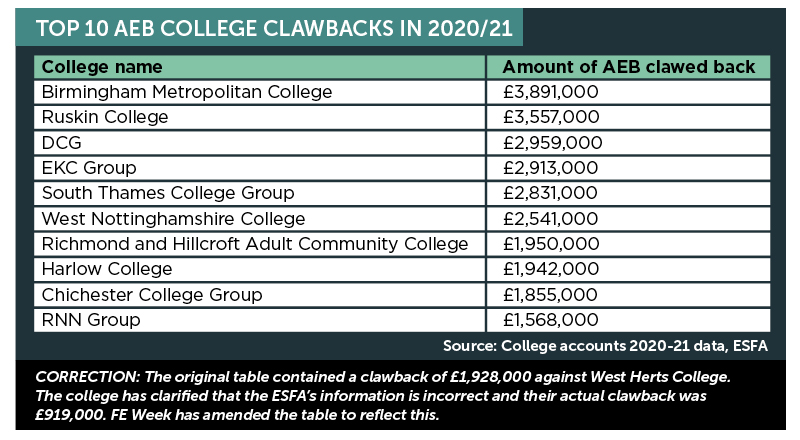Redundancies, slashing professional development budgets and merging classes are among lengths colleges have gone to in mitigating the impact of the controversial AEB clawback (adult education budget), an FE Week investigation has found.
Analysis of government data showed that £61.4 million had been clawed back by the Education and Skills Funding Agency from 103 institutions, where less than 90 per cent of their AEB allocation was spent in 2020/21.
The threshold proved divisive when it was announced in March last year, after being set at 68 per cent the year before as a result of the Covid-19 pandemic and lockdowns limiting in-person teaching. Colleges had argued that the pandemic had continued to impact teaching and finances during 2020/21 – particularly in areas which experienced local lockdowns as well as nationwide restrictions.
The ESFA had initially refused a business case process for colleges to explain why they should be given leniency for missing the 90 per cent target, but u-turned on that in July last year.
Despite more than 80 per cent of those that submitted a business case being given some sort of reprieve (even if it wasn’t for the full amount they wished to retain), colleges have still suffered as a result.
Following the recent publication of the ESFA’s AEB clawback data, most institutions have remained tight-lipped about the impact this has had, but an FE Week investigation has uncovered some of the struggles.
Derby College Group, which was among six colleges where more than £2 million was clawed back, confirmed it had been forced to make redundancies (24 voluntary and 22 compulsory) while 24 workers were redeployed within the organisation.
In its annual accounts for the year ending July 2021, the college said: “As a result of an announcement by the ESFA to only reduce the tolerance on the AEB funding stream to 90 per cent, significantly higher than the previous year, where there was a lesser impact on adult education for DCG, DCG undertook a major restricting [restructuring] exercise in the latter part of 2020/21 in order to compensate for the anticipated clawback of AEB funding.”
West Nottinghamshire College had just over £2.5 million clawed back, but said its favourable cash position from an in-year surplus meant ESFA advice indicated a business case wouldn’t be successful.
It made adjustments to its finances mid-year, which meant no staff reductions were needed, but it still had to make some changes.
The college confirmed it had limited recruitment of new staff, as well as use of its capital budget. Budgets for areas such as staff training and development were also reduced.
“Although it was reasonable that colleges were incentivised to deliver more AEB activity, the revised targets were too high and achieving them was always going to be immensely challenging, given the Covid-19 pandemic, with various lockdowns affecting the ability to deliver face-to-face provision,” a college spokesperson said.
“Mansfield and Ashfield had among the highest rates of Covid infections during the second wave in early 2021, which impacted upon us disproportionately. Furthermore, the college continued to incur staffing costs and did not access support through the government’s furlough scheme, which we feel should be recognised.”

RNN Group, which runs Rotherham, North Notts and Dearne Valley colleges, said it was unable to comment on the measures it had taken, but in board meeting minutes from October said it was “reviewing class sizes, and decisions may be taken to merge some to make them more efficient”, explaining that the AEB underachievement had been “significant”.
A spokesperson said: “The group recognises the need to apply appropriate performance management to public funding based upon evidenced impact and remains committed to ensuring value for money and high levels of quality in public funding.
“It is felt, however, that the significant impact of Covid-19 upon educational providers strongly focussed upon meeting the needs of both local communities and employers could have been given greater recognition.”
RNN secured the second highest amount in its business case, at just over £1.5 million, behind only Leicester College, which was allowed to keep £2.1 million.
Leicester had been a vocal opponent of the clawback back in March 2021, with its students’ union launching a petition with more than 5,000 signatures against the policy, albeit before the business case process had been allowed.
In a blog post on its website prior to the business case announcement, principal Verity Hancock said the college faced having to hand back around £4 million, warning of “serious consequences” for cashflow, capital programmes and future plans.
In the final figures Leicester had £701,000 to return. The college did not wish to comment further.
Chichester College also declined to comment, but in its report and financial statement for the year ending July 2021 it said that additional in-year enrolments in 2021/22 may be needed to offset the clawback.
Ruskin College had the second highest amount clawed back – £3.5 million, behind only Birmingham Metropolitan College’s £3.8 million – and cited ESFA clawbacks and Covid-19’s impact on student recruitment in its year-end financial report last July. A spokesperson from the University of West London, which acquired the college in August last year, said a strategic plan had helped move the college on to a break-even position this financial year.
Of the 103 institutions where some level of funding was returned, 19 had more than £1 million clawed back, which included two above £3 million and four between £1 million and £2 million.
Justifying its switch to the 90 per cent threshold back in March 2021, the ESFA said it acknowledged the situation was difficult for providers but 90 per cent was “a fair representation of grant-funded providers’ average delivery”.
It also cited the remote learning arrangements colleges were forced to develop at the start of the pandemic as an “effective contingency” to continue delivering learning.
In January, the Department for Education revealed that 78 providers had submitted a business case, 58 of which were from general further education colleges. Of those, 48 were successful.
Its criteria was for providers to demonstrate that “local circumstances made it impossible for the provider to deliver at or close to the 90 per cent level” or that “applying the full amount of AEB clawback would cause significant financial difficulties for the provider”.

















Your thoughts